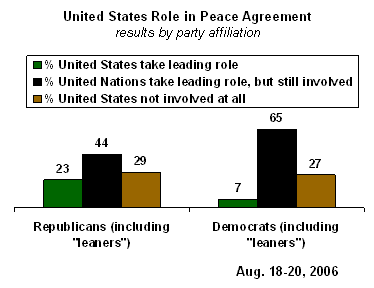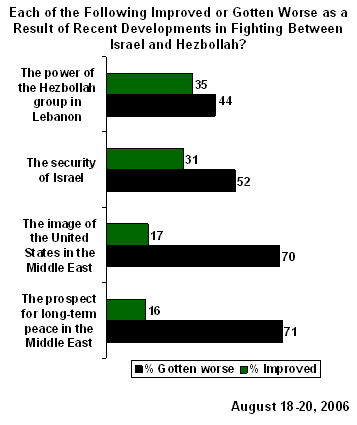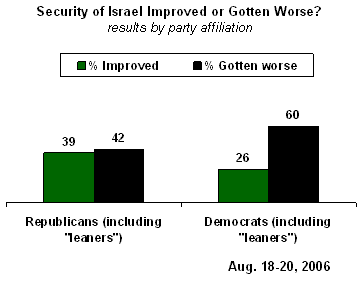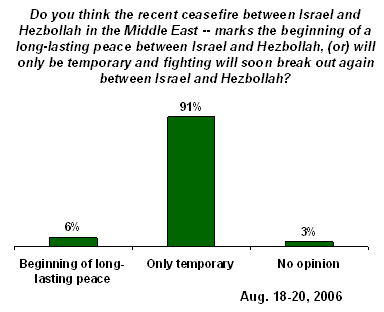GALLUP NEWS SERVICE
PRINCETON, NJ -- Last week's ceasefire between Israel and Hezbollah brings hope that the two sides will be able to settle their differences in the coming weeks, but raises the question about what involvement the United States will have in the development of a peace agreement in this conflict. The American public is highly skeptical that the ceasefire will hold, according to a new USA Today/Gallup poll. Americans want the United Nations to take the leading role in the development of a peace agreement but say that the United States should still be involved, at least minimally, in the process. A majority of Americans feel the image of the United States in the Middle East, the long-term prospects for peace in the region, and the security of Israel have been hurt by the recent violence. Americans are more divided in their views as to whether Hezbollah has gotten stronger or weaker as a result of the fighting.
Americans Do Not Want U.S. to Take Lead Role in Peace Agreement
The poll, conducted August 18-20, finds that the American public does not want the United States to take the leading role in the development of a peace agreement between Israel and Hezbollah and roughly 3 in 10 do not want the U.S. to be involved at all.
What role do you think the U.S. should play in developing a peace agreement between Israel and Hezbollah? Do you think the U.S. should -- take the leading role, let the United Nations take the leading role but still be involved, or not get involved at all?
Do you think the United States should play a major role or a minor role in the development of a peace agreement?
COMBINED RESPONSES (ASKED OF A HALF SAMPLE)
|
2006 Aug 18-20 |
||
|
% |
||
|
United States should take leading role |
14 |
|
|
United Nations take leading role, but U.S. still involved |
56 |
|
|
(U.S. should play major role) |
(21) |
|
|
(U.S. should play minor role) |
(35) |
|
|
United States should not get involved at all |
29 |
|
|
No opinion |
2 |
|
Only 14% of Americans feel the United States should take the leading role in the development of a peace agreement. The majority of Americans, 56%, say the United Nations should take the leading role, but that the United States should still be involved, with Americans more likely to say that involvement should be minor (35%) rather than major (21%). Twenty-nine percent of Americans say the United States should not get involved in the peace process at all.
Republicans (including those independents who lean toward the Republican Party) and Democrats (including Democratic-leaning independents) differ in their views of the U.S. role in the peace process, with Republicans (23%) considerably more likely than Democrats (7%) to say the United States should take a leading role.

Image of the U.S., Long-term Peace Prospects Hurt by Recent Violence
The poll asked Americans if each of four different situations have improved or gotten worse as a result of the recent developments in the Middle East relating to the fighting between Israel and Hezbollah. Roughly 7 in 10 Americans feel that both the prospects for long-term peace in the Middle East and the image of the United States in the Middle East have gotten worse. A majority, 52%, also says that the security of Israel has gotten worse. Americans are more divided in their views of Hezbollah's power in the region, with 35% saying it has improved and 44% saying it has gotten worse.

Republicans are more positive than Democrats that the security of Israel has improved as a result of the recent developments in the Middle East, by a 39% to 26% margin. Still, most Democrats feel Israel's security has gotten worse. There are only minor or no partisan differences in views of the other three items.

Most Americans View Recent Ceasefire as Temporary Halt to Violence
The ceasefire between Israel and Hezbollah went into effect on August 14, but a vast majority of Americans remain skeptical that this is the beginning of a long-lasting peace in this region. (In fact, Israel violated the ceasefire agreement on Saturday when it raided a Hezbollah stronghold in Lebanon). Ninety-one percent of Americans told Gallup the ceasefire would only be temporary and that fighting would soon break out again between Israel and Hezbollah; only 6% felt the ceasefire marked the beginning of a long-lasting peace between the two groups. This finding is consistent with other Gallup polling in recent years, which has shown deep pessimism among Americans that there will ever be peace between Israel and her neighbors in the Middle East region.

Survey Methods
The latest results are based on telephone interviews with a randomly selected national sample of 1,001 adults, aged 18 and older, conducted August 18-20, 2006. For results based on this sample, one can say with 95% confidence that the maximum error attributable to sampling and other random effects is ±3 percentage points. In addition to sampling error, question wording and practical difficulties in conducting surveys can introduce error or bias into the findings of public opinion polls.
18. As a result of the recent developments in the Middle East related to the fighting between Israel and Hezbollah, do you think -- [RANDOM ORDER] -- has improved or gotten worse?
|
2006 Aug 18-20 (sorted by "improved") |
Improved |
Gotten worse |
NO DIFFERENCE (vol.) |
No opinion |
|
% |
% |
% |
% |
|
|
The power of the Hezbollah group in Lebanon |
35 |
44 |
3 |
17 |
|
The security of Israel |
31 |
52 |
7 |
10 |
|
The image of the United States in the Middle East |
17 |
70 |
8 |
5 |
|
The prospect for long-term peace in the Middle East |
16 |
71 |
8 |
5 |
|
(vol.) = Volunteered response |
||||
19. What role do you think the U.S. should play in developing a peace agreement between Israel and Hezbollah? Do you think the U.S. should -- take the leading role, let the United Nations take the leading role but still be involved, or not get involved at all?
20. Do you think the United States should play a major role or a minor role in the development of a peace agreement?
COMBINED RESPONSES (Q.19-20): BASED ON 500 NATIONAL ADULTS IN FORM A
|
2006 Aug |
||
|
United States should take leading role |
14 |
|
|
United Nations take leading role, but U.S. still involved |
56 |
|
|
(U.S. should play major role) |
(21) |
|
|
(U.S. should play minor role) |
(35) |
|
|
United States should not get involved at all |
29 |
|
|
No opinion |
2 |
|
21. Do you think the recent ceasefire between Israel and Hezbollah in the Middle East -- [ROTATED: marks the beginning of a long-lasting peace between Israel and Hezbollah, (or) will only be temporary and fighting will soon break out again between Israel and Hezbollah]?
BASED ON 501 NATIONAL ADULTS IN FORM B
|
Beginning of long-lasting peace |
Only temporary |
No opinion |
|
|
2006 Aug 18-20 |
6% |
91 |
3 |
